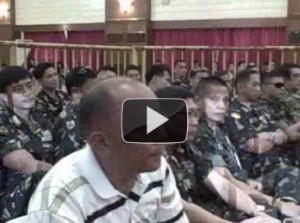By TESSA JAMANDRE
THE mutiny case against the 28 officers in connection with the alleged February 2006 plot to withdraw support from President Gloria Arroyo is on its final stretch.
The prosecution presented on Wednesday its last and most important witness. Presidential Management Staff chief Hermogenes Esperon Jr., who was Armed Forces Chief of Staff at the time, had ordered the detention of the 28 officers—nine from the Marines led by their commandant, Maj. Gen. Renato Miranda, and 19 Army Scout Rangers led by Brig. Gen. Danilo Lim.
In the next hearing scheduled on Oct. 12, the prosecution is expected to rest its case and the defense will be making its oral motion for a finding of not guilty and submitting the case for resolution.
During the court martial hearing on Wednesday, Esperon testified on the supposed plot, as revealed in the meeting in which Lim and Marine Col. Ariel Querubin were said to be convincing the Chief of Staff to lead them in a mass protest action.
The prosecution attempted to offer new documentary evidence that Esperon had submitted. But the panel ruled against its admission because it violated the pre-trial agreement.
At the cross-examination, the defense got Esperon to admit that at the time he appointed and constituted the Special General Court Martial in November 2006 he had already labeled the accused as “destabilizers” and “power grabbers” nine times in a six-page affidavit he prepared in May 2006.
The counsel for Querubin, lawyer Sigfred Fortun, also established the fact that Esperon had already prepared his affidavit even before a court martial had been created to try the case of the detained officers.
Esperon ordered the creation of a special military court through an unsigned Pre-Trial Advice (PTA) after he reversed the recommendations of a pre-trial investigation team composed of military lawyers to file minor charges, not mutiny, against the 28 officers.
In the military, the Pre-Trial Investigation Report is only reviewed by the Judge Advocate General Office to see if it is in order and conforms to form and procedure. But the JAGO cannot reverse the recommendations in a PTA. The commander or the convening authority can only either sustain or lower the recommendations, not reverse them to raise the offense. Esperon, however, reversed the findings of the pre-trial investigation team in an unsigned PTA which served as the charge sheet against the 28 officers.
The accused had long waited for that moment to face their accuser. When Esperon finally arrived in court, the room turned silent as he was ushered to the witness stand. The accused and accuser then locked eyes with each other.
(It was the first time that the military court allowed video/photo opportunities: twice during the hearing even while it was ongoing and five minutes at the start of Esperon’s testimony at the witness stand.—Ed.)
